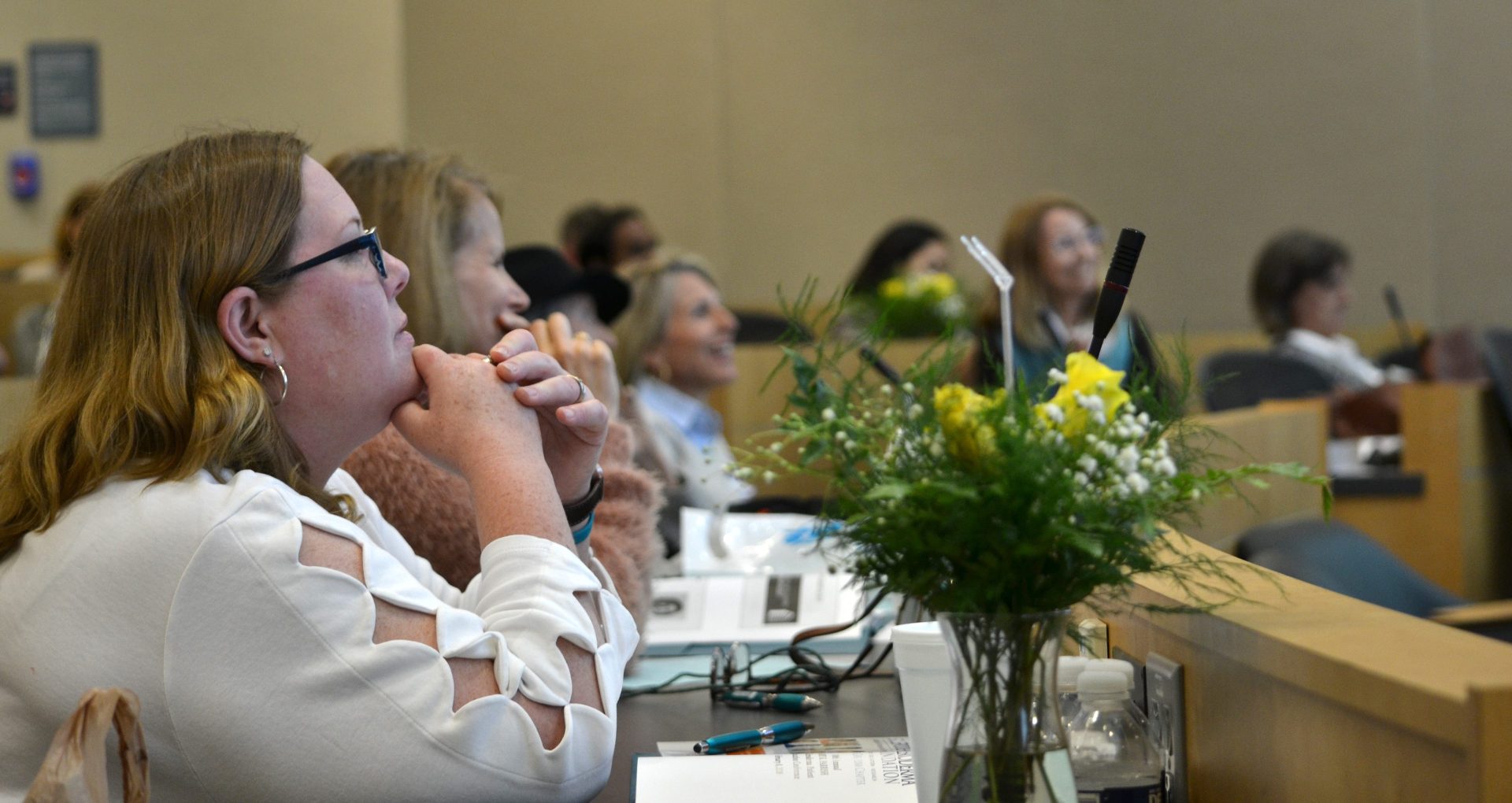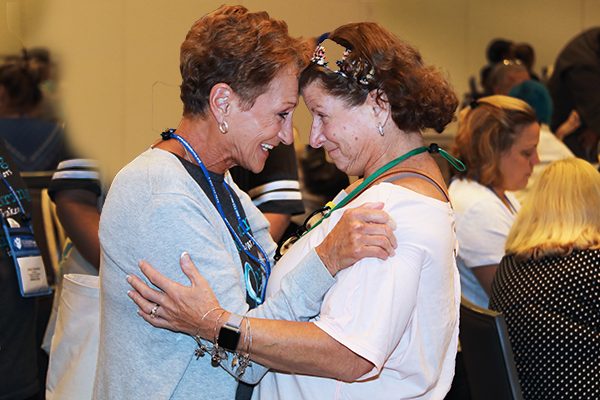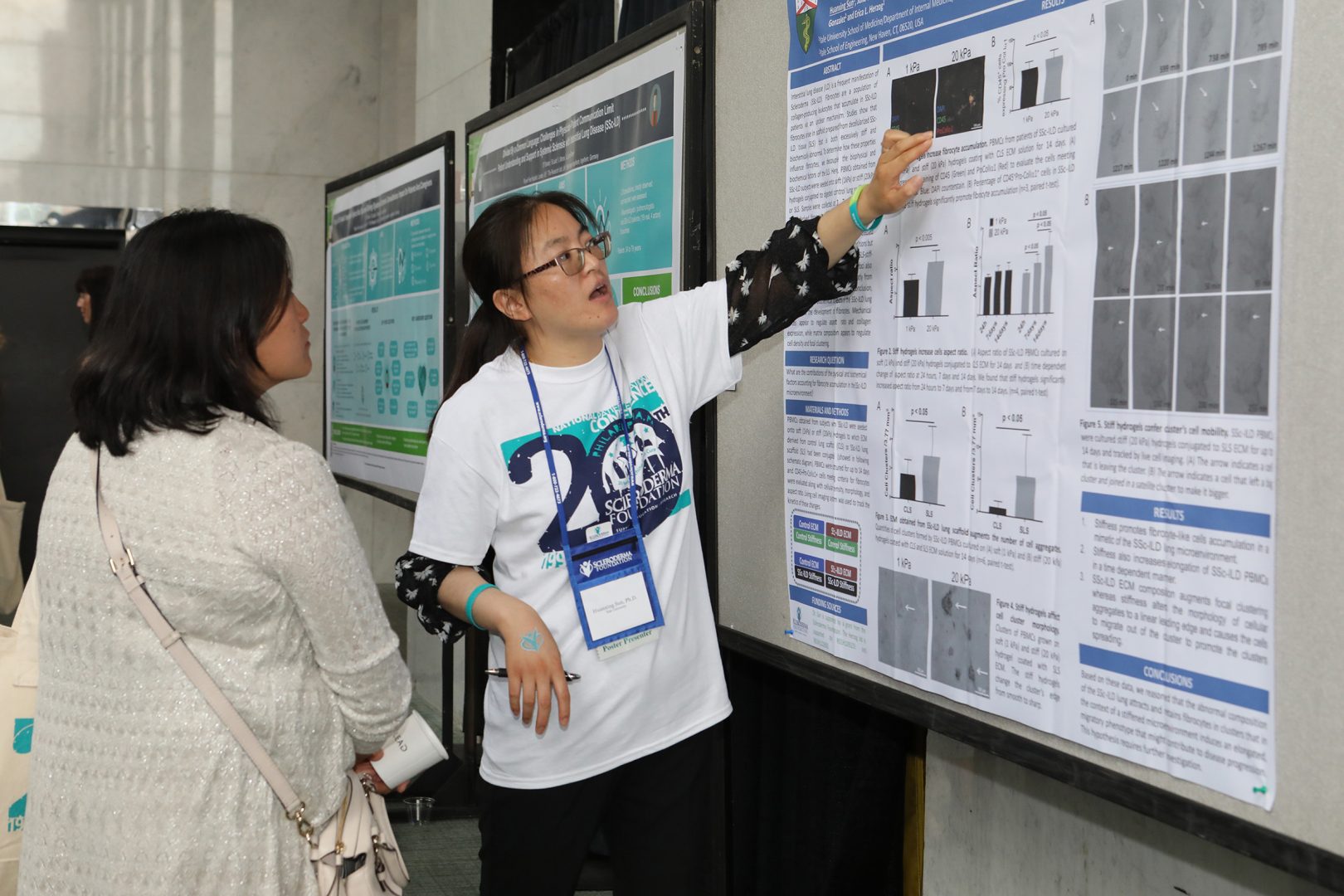
The National Scleroderma Foundation fosters development of innovative, high-quality research by new and established investigators in fields related to scleroderma. To accomplish this goal, we provide funding for New and Established Investigators based on investigator-directed topics. Current research investment exceeds $1.5 million annually.
Applications for the 2025 grant cycle will open in April, 2024
Deadline: September 16, 2024, 5:00 p.m. Eastern Time (U.S.)
Funding Opportunities
Below are details regarding the purpose, eligibility, terms, and objectives for New Investigator and Established Investigator grants.
Purpose:
The National Scleroderma Foundation seeks applications from promising new investigators who hold faculty or equivalent positions and who wish to pursue a career in research related to scleroderma. This grant supports promising research that is likely to lead to individual research project grants.
Eligibility Requirements:
Applications may be submitted by domestic non-profit organizations, public and private such as universities, colleges, hospitals, and laboratories. Foreign organizations and institutions are not eligible. These new investigator grants may not be used to support thesis or dissertation research or fellowship training. Applicants must have a doctoral degree in Medicine, Osteopathy, Veterinary Medicine or one of the sciences; and must have completed a postdoctoral fellowship by the grant award date. Applicants who have been a principal investigator on grants from the National Scleroderma Foundation or other national, private or government agencies other than fellowship grants are not eligible for this award.
Investigators who have questions about eligibility should contact the National Scleroderma Foundation at research@scleroderma.org for more information.
Terms of Award:
The New Investigator Award is a three-year award in the amount of $200,000 total. Applicants may request up to $66,667 per year (this amount is to include budgeted indirect costs) for up to three years, with the total award not to exceed $200,000. A maximum of 8% of the proposed yearly budget may be allocated to indirect costs. These awards are not renewable. Before completion of this grant, investigators are encouraged to seek continuing support for research through other grant mechanisms through private or government agencies. Replacement of the principal investigator on this award is not permitted. There will be no routine escalation for future years.
Awards are contingent on the availability of funds and the receipt of sufficiently meritorious applications meeting the stated eligibility requirements.
Research Objectives:
The New Investigator Grant is designed to facilitate the entry of promising new investigators into areas of research related to scleroderma.
Applications for the 2025 grant cycle will open in April, 2024
Deadline to apply: September 16, 2024
For application questions please email research@scleorderma.org
Purpose:
The National Scleroderma Foundation seeks applications from promising established investigators both inside and outside the field of scleroderma research who wish to propose pilot studies to obtain preliminary data dealing with a highly innovative and/or highly relevant theme related to the disease. This grant will support pilot research that is likely to lead to more substantial unlimited research project grants from federal or non-federal sources.
Eligibility Requirements:
Applications may be submitted by domestic non-profit organizations, public and private such as universities, colleges, hospitals and laboratories. Foreign organizations and institutions are eligible. Applicants must have a doctorate degree in Medicine, Osteopathy, Veterinary Medicine or one of the sciences; must have completed a postdoctoral fellowship; and have been principal investigator on grants from the National Scleroderma Foundation or other national, private or government agencies in the past.
Investigators who have questions about eligibility should contact the National Scleroderma Foundation at research@scleroderma.org for more information.
Terms of Award:
The Established Investigator Award is a two-year award in the amount of $200,000 total. Applicants may request up to $100,000 per year (this amount is to include budgeted indirect costs) for up to two years, with the total award not to exceed $200,000. A maximum of 8% of the proposed yearly budget may be allocated to indirect costs. These awards are not renewable. Before completion of this grant, investigators are encouraged to seek more substantial continuing support for research through other grant mechanisms through private or government agencies. Replacement of the principal investigator on this award is not permitted. There will be no routine escalation for future years.
Awards are contingent on the availability of funds and the receipt of sufficiently meritorious applications meeting the stated eligibility requirements.
Research Objectives:
The National Scleroderma Foundation Established Investigator Grant is designed to facilitate highly innovative or highly relevant and meritorious pilot projects by established investigators in areas of research related to scleroderma that will culminate in more substantial funding from Federal or non-federal granting agencies such as the National Institutes of Health, National Science Foundation and the Department of Defense or Veterans Affairs.
Applications for the 2025 grant cycle will open in April, 2024
Deadline to apply: September 16, 2024
For application questions please email research@scleorderma.org
Review Considerations
The National Scleroderma Foundation peer review committee will review applications for responsiveness to the research objectives of the National Scleroderma Foundation and for the eligibility of the Principal Investigator under the requirements stated above. Applications found to be unresponsive to these guidelines will be returned without further consideration. Applications that are complete and responsive to the guidelines of the National Scleroderma Foundation will be evaluated for scientific and technical merit.
Review Criteria
In the written review, comments on the following aspects of the application will be made in order to judge the likelihood that the proposed research will have a substantial impact on the pursuit of these goals. Each of these criteria will be addressed and considered in the assignment of the overall score.
- Significance. Does this study address an important problem related to SSc? If the aims of the application are achieved, how will scientific knowledge be advanced? What will be the effect of these studies on the concepts or methods that drive this field?
- Approach. Are the conceptual framework design, methods, and analyses adequately developed, well-integrated, and appropriate to the aims of the project? Does the investigator acknowledge potential problem areas and consider alternative tactics?
- Innovation. Does the project employ novel concepts, approaches or methods? Are the aims original and innovative? Does the project challenge existing paradigms or develop new methodologies or technologies?
- Investigator. Is the investigator appropriately trained and well suited to carry out this work? Is the work proposed appropriate to the experience level of the principal investigator and other researchers (if any)? Is there evidence the applicant is committed to pursuing research related to scleroderma?
- Environment. Does the scientific environment in which the work will be done contribute to the probability of success? Do the proposed experiments take advantage of unique features of the scientific environment or employ useful collaborative arrangements? Is there evidence of institutional support?
The personnel category will be reviewed for appropriate staffing based on the requested
percent effort. The direct costs budget request will be reviewed for consistency with the proposed methods and specific aims. Budgetary adjustments may be made by the review panel or the National Scleroderma Foundation. The duration of support will be reviewed to determine if it is appropriate to ensure successful completion of the requested scope of the project.
Award Criteria
The following will be considered in making funding decisions:
- Scientific merit of the proposed project as determined by peer review.
- Importance of the area to scleroderma research.
- Availability of funds.
Appropriate research areas may include but are not limited to the following as they relate to scleroderma:
- Scleroderma-related lung disease.
- Pediatric scleroderma.
- Vascular manifestations.
- Studies of animal models.
- Therapeutic modalities.
- Mechanisms of end organ damage.
- Immunologic studies.
- Endothelial cell biology.
- Fibroblast biology.
- Models and markers of gender and geneticfactors.
- Cell signaling.
- Epidemiology studies.
- Matrix biology.
- Stem cell biology.
- Health services research (e.g. quality of life,health care delivery.)
- Study of clinical manifestation.
Application Restrictions
Applicants may submit only one grant application per grant review.
No more than two (2) grants in any given year will be awarded to any institution or major branches of institution (e.g. University of California San Diego, University of California San Francisco.)
Unless unusual circumstances prevail, National Scleroderma Foundation may fund applicants for only three consecutive years for New Investigator
Grants and two years for Established Investigator Grants.
Applications failing to strictly adhere to the National Scleroderma Foundation guidelines will be administratively disqualified and not be further reviewed.
Applicants may hold only one grant at any given time from the National Scleroderma Foundation.
Applicants who have been funded by the National Scleroderma Foundation must wait one year after their grant has ended to reapply.
Revised grants utilizing critiques from the previous submission may be resubmitted no more than once.
Before research can begin, grant agreements must be signed and all approvals such as IRB must be obtained.
Additionally, the Foundation offers funding in two targeted areas of study:
Scleroderma-Related Lung Disease— The Debra Lurvey Memorial Research Grant, funded by a generous donor, is awarded in the amount of $200,000 to an established investigator conducting scleroderma-related lung disease research.
Pediatric Scleroderma— Pediatric scleroderma research is earmarked for up to $500,000 in awards and is open to submissions from both new and established investigators.
There are four named-grants presented to the highest scoring research proposals. These awards honor special individuals who made lasting impacts on the Foundation and scleroderma research through their individuals efforts and contributions. Expand the boxes below to learn more.
- Marta Marx Fund for the Eradication of Scleroderma
- Mark Flapan Award
- Debra Lurvey Memorial Research Grant
- Walter and Marie Coyle Research Grant
Most patient-oriented research in the U.S. is funded by the pharmaceutical industry. Scleroderma, as an “orphan disease,” has not traditionally attracted much support or interest. One man and one woman decided to do something about this.
In 2000, the late Rudolph Juhl, a New York stockbroker, honored his sister, Marta Marx with the largest gift ever made to the National Scleroderma Foundation—a $5 million bequest to establish the Marta Marx Fund for the Eradication of Scleroderma.
Mr. Juhl’s bequest fulfilled a longstanding promise. Many years ago, Mr. Juhl wrote to Marie Coyle, then President of the Scleroderma Federation, expressing his frustration that drug companies were not doing more to promote research on the cause and cure for scleroderma. Thus began a correspondence, which culminated in a vow by Rudolph Juhl that when he died he would leave money to be used solely for scleroderma research.
In 2002, the Estate of Marta Marx added to the Marta Marx Fund for the Eradication of Scleroderma with an additional gift of $5 million thus making the total gift for scleroderma research $10 million.
In September 2000 the Foundation convened a blue-ribbon group of scleroderma experts in Pittsburgh to plan how to put these new funds to work. As a result, we have now increased our grant amounts and added an overhead expense component. In honor of Mr. Juhl’s gift, the Foundation has designated the Marta Marx Fund for the Eradication of Scleroderma Award to be presented to a recipient of a research grant whose score ranks among the top two scored proposals. We need more generous gifts like Rudolph Juhl’s to accomplish the ultimate goal: a cure for scleroderma.
The Mark Flapan Award is presented annually to a scleroderma researcher whose proposal for a research grant is ranked highly by the Peer Review Committee of the National Scleroderma Foundation. Along with the Marta Marx Eradication of Scleroderma Award, the Flapan Award is one of the two highest ranking grant proposals as scored by the committee.
The award is named in honor of the late psychologist and scleroderma patient whose contributions to the Foundation’s publications and literature of scleroderma paved the way for greater patient understanding.

The Debra Lurvey Memorial Research Grant was established in 2021. The grant is presented every other year to an established researcher focusing on scleroderma-related lung research. The priority focus of the award is lung-related research; however, in the event that no lung-related proposal scores high enough in the peer-review process, the grant may be awarded to research focusing on scleroderma-related cardiovascular complication. The $200,000 award is for a two-year commitment.
The endowed grant is established in memory of Debra Lurvey, who lost her battle to scleroderma, thanks to the generosity of her husband, Greg Lurvey.
Marie and Walter Coyle were among the founders of the National Scleroderma Foundation, in addition to founding one of its predecessor organizations, the National Scleroderma Federation. For more than 30 years, Walter and Marie were tireless volunteers and devoted champions for scleroderma-related causes, working almost full-time for the Foundation’s New England Chapter and the national office of the organization. During their long tenure of service with the Foundation, they both served on the national Board of Directors.
Marie is credited with being the architect of the Foundation’s Peer-Review Research Program.
Both Marie and Walter have been honored as the National Scleroderma Foundation’s “National Volunteer of the Year” in recognition for their long and dedicated service to the organization at all levels.
Upon Walter’s passing in 2009, The Walter A. Coyle Memorial Research Grant was established. The grant was renamed to include Marie on the occasion of her retirement and in honor of her 40 years of distinguished volunteer service.
The Foundation’s grant funding cycle begins in April each year. To receive notifications of our annual research grant opportunities, click the button below to submit your email address.

No two scleroderma journeys are the same, but there are common experiences along the way. No matter where you or your child are in your journey, or what type of scleroderma you have, the National Scleroderma Foundation can help you find your best path.


